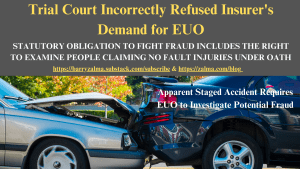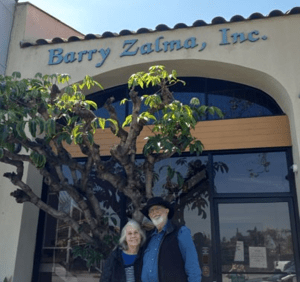Trial Court Incorrectly Refused Insurer’s Demand for EUO

STATUTORY OBLIGATION TO FIGHT FRAUD INCLUDES THE RIGHT TO EXAMINE PEOPLE CLAIMING NO FAULT INJURIES UNDER OATH
Apparent Staged Accident Requires EUO to Investigate Potential Fraud
Post 4995
See the full video at https://rumble.com/v6kcwbp-trial-court-incorrectly-refused-insurers-demand-for-euo.html and at https://youtu.be/NdULbyd5aWM
The trial court initially denied Allstate’s suit stating that Allstate failed to show good cause and did not cite any contractual provision compelling the Appellees to provide information in an examination under oath (“EUO”). Allstate argued that it had a duty to investigate suspected insurance fraud and that the Appellees had a contractual obligation to submit to EUOs.
In Allstate Property And Casualty Insurance Company v. Gloria E. Companioni; Isair H. Lubo-Rodriguez; and Mercedes H. Cervantes, No. 2023-CA-1012-MR, Court of Appeals of Kentucky (February 7, 2025) resolved the dispute.
The Court of Appeals of Kentucky vacated the trial court’s total denial of the petition and remanded the case for further proceedings. The appellate court found that the trial court overlooked contractual provisions allowing Allstate to conduct EUOs and binding precedent that permits inquiries into accident-related issues. The appellate court directed the trial court to reconsider whether good cause exists to allow questioning pertaining to medical treatment and solicitation, following the principles set forth in Deadwyler v. Grange Property and Casualty Insurance Company.
The appellate court’s decision emphasized the importance of allowing insurers to conduct thorough investigations, especially when there are concerns about potential fraud. The case highlights the balance between protecting claimants’ rights and ensuring that insurers can fulfill their duty to investigate claims thoroughly.
FACTS
Gloria Companioni was driving a car insured by Allstate which was in an accident with another car. Appellees Isair Lubo-Rodriguez and Mercedes Cervantes were allegedly riding in the car Companioni was driving when the accident happened. All three resided in Kentucky.
Four days after the accident, all three Appellees commenced care at Total Health Chiropractic and Rehab (“Total Health”). The next day (five days after the accident), Appellees submitted Personal Injury Protection (“PIP”) applications through counsel. Appellees requested reimbursement for medical treatment resulting from the accident and for any coverage available, including coverage for basic reparations benefits (“BRB”).
Allstate filed a suit for an EUO pursuant to Kentucky statutes.
ANALYSIS
Trial Court Erred in Finding Allstate Failed to Cite a Contractual Provision Which Required Appellees to Submit to EUOs
The trial court overlooked policy provisions relating to EUOs, but it also overlooked pertinent authority allowing inquiries into predominantly accident-related issues in EUOs. In sum, its total denial of the EUO petition cannot stand and must be vacated with the case remanded to the trial court for further proceedings.
The appellate court directed the trial court to consider its guidance in considering anew whether good cause exists to permit questioning about matters of medical treatment and/or solicitation via EUO and, if so, to establish any appropriate limits on such questioning.
The trial court’s total denial of the EUO petition was vacated and remanded for the trial court to issue a new order allowing an EUO at least regarding purely accident-related issues, to reconsider whether good cause exists to permit inquiries pertaining to medical treatment and solicitation, and to provide direction to the parties as to the permissible scope of inquiry.
Kentucky, like most states, requires insurers to maintain a Special Fraud Investigative Unit to help the state defeat insurance fraud and to protect every insurer doing business in the state from damages from fraud. Allstate, faced with an apparent staged accident sought to examine the parties claiming injury under oath in its effort to fully investigate a potential insurance fraud. The trial court refused but the Court of Appeals of Kentucky reversed requiring the trial court to approve the EUOs.
 (c) 2025 Barry Zalma & ClaimSchool, Inc.
(c) 2025 Barry Zalma & ClaimSchool, Inc.
Please tell your friends and colleagues about this blog and the videos and let them subscribe to the blog and the videos.
Subscribe to my substack at https://barryzalma.substack.com/subscribe
Go to X @bzalma; Go to Newsbreak.com https://www.newsbreak.com/@c/1653419?s=01; Go to Barry Zalma videos at Rumble.com at https://rumble.com/account/content?type=all; Go to Barry Zalma on YouTube- https://www.youtube.com/channel/UCysiZklEtxZsSF9DfC0Expg
Go to the Insurance Claims Library – https://lnkd.in/gwEYk
Like this:
Loading…
Related
About Barry Zalma
An insurance coverage and claims handling author, consultant and expert witness with more than 48 years of practical and court room experience.



